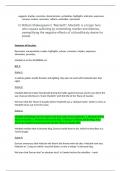suggests, implies, connotes, demonstrates, symbolises, highlights, indicates, expresses,
conveys, evokes, resonates, reflects, embodies, represents
In William Shakespeare’s “Macbeth”, Macbeth is a tragic hero
who causes suffering by committing murder and distress,
exemplifying the negative effects of a bloodthirsty desire for
power.
Summary of the play:
Resonates, encapsulated, evokes, highlights, echoes, connotes, implies, expresses,
stimulates, provokes,
Macbeth Is in the JACOBEAN era
Act 1:
Scene 1:
3 witches gather amidst thunder and lighting, they plan to meet with Macbeth later that
night.
Scene 2:
Macbeth kills the traitor Macdonald during the battle against Norway and he won them the
war. Duncan tells Ross to ‘Greet Macbeth’ with the title of the Thane of Cawdor.
We learn that the Thane of Cawdor before Macbeth was a ‘disloyal traitor’ which is ironic as
Macbeth turns out to be the same.
Scene 3:
Macbeth and Banquo see the witches and they make three prophecies. 1. Macbeth will be
Thane of Cawdor. 2. Macbeth will become king. 3. Banquo’s children will be kings. Ross
arrives to Macbeth and pronounces him the Thane of Cawdor title.
Macbeth realises that to become king, Duncan would have to die, which he describes as a
‘horrid image’.
Scene 4:
Duncan announces that Malcolm will inherit the throne when he dies. Macbeth now sees
Malcolm as “a step on which I must fall down, or else o’erleap” to become king.
We learn that Duncan had ‘an absolute trust’ in Cawdor before the rebellion – ironic
,Also, we find out Macbeths castle is in Inverness.
Scene 5:
Lady Macbeth reads the letter from Macbeth about his encounter with the witches. She
fears he is ‘too full o’th the milk of human kindness to catch the nearest way’ of achieving
the throne. Macbeth arrives at the castle and Lady Macbeth instantly plants her murderous
intentions in Macbeths head as Duncan is on his way there – she tells him to act completely
normal as well.
Lady Macbeth fears that Macbeths kindness will get in the way of their ambition.
Scene 6:
Duncan and the Thanes arrive at Macbeth’s castle, Duncan is delighted to see the ‘honoured
hostess’ Lady Macbeth.
Duncan and Banquo praise the peacefulness of Macbeth’s castle.
Scene 7:
Macbeth is contemplating whether to kill Duncan or not – and he decides to not kill him.
Lady Macbeth is furious when Macbeth tells her he won’t kill Duncan and she continues to
persuade him. Her plan is to drug the 2 guards so Macbeth can go straight to Duncan in the
night – they will frame the guards for the murder by covering their daggers in Duncan’s
blood – and they must act horrified when ‘finding out’ Duncan is dead.
Act 1 is where we see Macbeth decide to kill Duncan – he gets very tempted by the witches’
prophecies, his ambition, and the words of Lady Macbeth.
Act 2:
Scene 1:
Banquo and his son Fleance run into Macbeth during the night, and they are surprised he is
still awake. Banquo says he has been dreaming of the ‘three weird sisters’ last night and
Macbeth lies and says he hasn’t thought about what they said. After, on his way to kill
Duncan, he sees a vision of a bloody dagger in front of him and he tries to dismiss the
hallucination. He hears a bell and goes to kill Duncan.
We learn that Duncan generously thanks Macbeth for the evening by giving him a diamond
– ironic/ shows Macbeths ambition controls his morality.
, Scene 2:
Macbeth returns from the murder; he is anxious and thinks he heard a noise, but Lady
Macbeth dismisses his fears. Macbeth forgot to plant the daggers on the guards, so Lady
Macbeth goes and does it – Macbeth hears a continuous knocking at the castle gates, and
we are unsure who it is.
Scene 3:
The porter answers the door to Macduff and Lennox who have come to see Duncan.
Macbeth takes Macduff to see Duncan where the murder is discovered, they sound the
alarms to wake everybody up. Macbeth says that he killed the guards in fury of what they
did to Duncan. Both Duncan’s sons immediately leave, Malcom goes to England and
Donalbain goes to Ireland.
There was a ‘terrible storm’ during the night in which ‘strange screams of death’ could be
heard in the wind – pathetic fallacy reflecting Macbeths actions and what he caused.
Scene 4:
Ross begins to talk about some unnatural things that have been happening recently, like
how some horses ‘turned wild in nature’ and started eating each other – also its dark during
daytime. (This shows that Macbeths actions have gone against the great chain of being and
the result of killing the king will cause unnatural things to happen). Macduff arrives and tells
ross that he thinks Malcolm and Donalbain bribed the guards and that’s why they fled. The
Thanes come to an agreement that Macbeth should be the next king, he will be crowned at
a place called Scone.
Act 3:
Scene 1:
Banquo suspects that Macbeth ‘played foully’ to get the throne. The Macbeths’ invite
Banquo over for dinner. When Banquo leaves, Macbeth delivers a soliloquy about his fears
that Banquo’s children will be future kings. Macbeth then convinces two murderers to kill
Banquo and his son Fleance.
Scene 2:
Macbeth is plagued by fears and envies Duncan who ‘sleeps well’ in his grave. Lady Macbeth
tells Macbeth to put a brave face on for the guests coming for dinner. He says his mind is
‘full of scorpions’ with fears about Banquo and Fleance. Macbeth doesn’t tell Lady Macbeth
about his plot to kill Banquo and Fleance.




